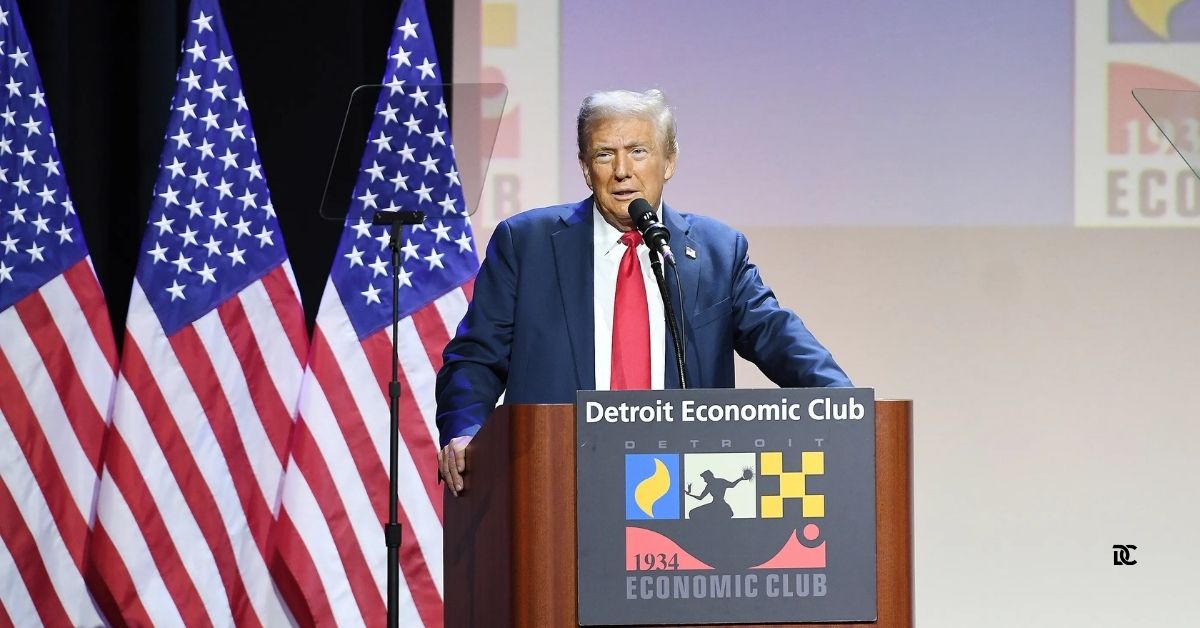Former President Donald Trump recently took the stage in Detroit, delivering a speech that has ignited widespread discussion and controversy. Speaking while campaigning, Trump made bold statements about Detroit, comparing the nation’s potential future to the city’s past economic struggles. His remarks have sparked a heated response from both supporters and critics within the community.
During his speech, Trump warned that if Vice President Kamala Harris were elected, the country could end up “like Detroit.” This statement was aimed at highlighting his concerns over economic decline, using Detroit as a cautionary example. “Detroit’s a developing area more than most places in China,” Trump declared, drawing a stark comparison between the U.S. and developing nations.
Trump’s comments focused on Detroit’s history as the powerhouse of American car production, emphasizing the city’s subsequent economic downturn. He suggested that without his leadership, the nation might face similar challenges. “Our whole country will end up being like Detroit if she’s your president. You’re going to have a mess on your hands,” he asserted, aiming to resonate with voters worried about economic stability.
Detroit, once the heart of the auto industry, has faced significant hardships over the decades. The city filed for bankruptcy in 2013 but has been steadily recovering since. Recent developments include the growth of the downtown area and a population increase for the first time since 1957. These positive changes stand in stark contrast to Trump’s portrayal of Detroit as a symbol of decline.
Also Read
On the day of Trump’s speech, Detroit was alive with activity. Thousands of fans attended a playoff baseball game and the opening game of the Detroit Red Wings season. The vibrant atmosphere highlighted the city’s ongoing recovery and resilience, challenging Trump’s negative narrative about Detroit’s future.
Michigan is a crucial swing state in the upcoming 2024 U.S. election. Polls indicate a tight race between Harris and Trump, making every campaign message highly impactful. Trump’s strategy includes targeting traditionally Democratic strongholds like Detroit, hoping to reduce Democratic margins and attract votes from diverse communities.
Democrats in Michigan quickly responded to Trump’s remarks with strong criticism. City leaders and local Democratic officials condemned his statements, defending Detroit’s progress and resilience. They emphasized the city’s successful recovery efforts and the positive changes taking place in its communities, countering Trump’s bleak outlook.
Detroit’s recovery is a story of determination and community effort. After emerging from bankruptcy, the city has focused on revitalizing its downtown and attracting new businesses. These efforts have led to economic growth and improved living standards for many residents, contradicting Trump’s depiction of Detroit as a city in decline.
Trump’s speech also touched on international competition, particularly referencing China’s development. By labeling Detroit as “a developing area more than most places in China,” he aimed to highlight what he perceived as weaknesses in America’s economic standing. This comparison was intended to resonate with voters concerned about job losses and economic stagnation.
However, many saw Trump’s remarks as unfair and misleading. Critics argue that Detroit’s current trajectory shows significant improvement and potential for future growth. The city’s investment in infrastructure, education, and technology sectors has laid the groundwork for sustained economic advancement, challenging Trump’s negative narrative.
Vice President Kamala Harris, whom Trump criticized, has strong support in Michigan. Her policies and initiatives have been credited with fostering economic opportunities and supporting underserved communities. Harris’s presence in Detroit symbolizes her commitment to revitalizing the state and addressing its challenges, making Trump’s warnings seem out of touch with the city’s actual progress.
The impact of Trump’s speech on Detroit’s political landscape remains to be seen. While his aggressive rhetoric aims to sway undecided voters, it also risks alienating those who have seen positive changes in the city. The response from local communities and leaders will play a crucial role in shaping voter perceptions and influencing the election outcome.
Detroit Remains a Vibrant Cultural Hub
The city hosts numerous events, festivals, and attractions that celebrate its rich heritage and diverse population. From music and arts to sports and cuisine, Detroit offers a dynamic environment that continues to attract visitors and new residents alike, further bolstering its economic recovery.
Trump’s strategy of targeting blue areas like Detroit reflects his broader campaign approach. By focusing on urban centers with significant Democratic support, he aims to disrupt traditional voting patterns and build a more competitive coalition. This tactic underscores the high stakes of the upcoming election and the intense competition for every vote in key swing states.
Despite the controversy, Detroiters remain optimistic about their city’s future. Community leaders and residents continue to work towards economic stability and growth, building on the progress made over the past decade. Their efforts highlight the resilience and determination that define Detroit’s spirit, countering the negative narrative presented by Trump.
As the election approaches, the dialogue around Detroit will remain a focal point. Trump’s remarks have ignited conversations about economic policy, urban development, and the role of leadership in shaping the future of American cities. These discussions are essential for understanding the broader implications of the election results and the direction the nation might take.
The support from local leaders and the ongoing success stories from Detroit’s recovery offer a counter-narrative to Trump’s warnings. They demonstrate that with effective policies and community engagement, cities can overcome economic challenges and thrive. This message resonates with voters who believe in the potential for positive change and the importance of strong, visionary leadership.
In the end, the election will serve as a referendum on the direction of cities like Detroit and the nation as a whole. Voters will weigh the promises and criticisms presented by candidates, making informed decisions about the future they want to see. Detroit’s example of resilience and growth stands as a testament to what can be achieved through collective effort and strategic planning.
Donald Trump’s recent comments about Detroit have reignited discussions about the city’s economic status and its role in the national political landscape. While his statements aim to highlight perceived weaknesses, the reality of Detroit’s ongoing recovery and growth presents a more hopeful picture. As the 2024 U.S. election approaches, Detroit will continue to be a key battleground, symbolizing broader themes of resilience, economic policy, and the future of American urban centers.
Voters in Michigan and beyond will look to the city’s progress as they make their decisions, underscoring the importance of informed and thoughtful leadership in shaping a prosperous future for all. Detroit’s example of overcoming economic hardships and revitalizing its communities offers a powerful counterpoint to Trump’s dire warnings, highlighting the potential for renewal and growth even in the face of significant challenges.
Donald Trump’s recent comments about Detroit have sparked intense debate and highlighted the city’s complex economic landscape. While Trump used Detroit as a cautionary tale to warn against electing Kamala Harris, the city’s ongoing recovery and growth tell a different story.






